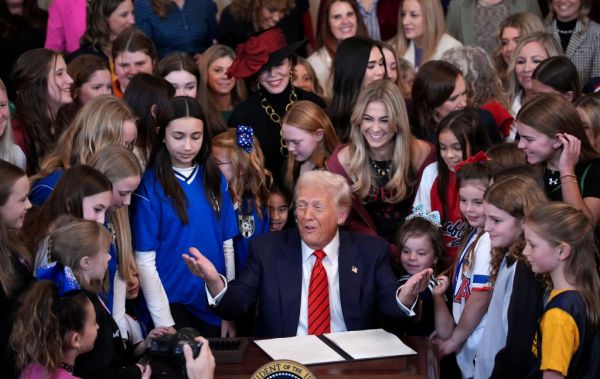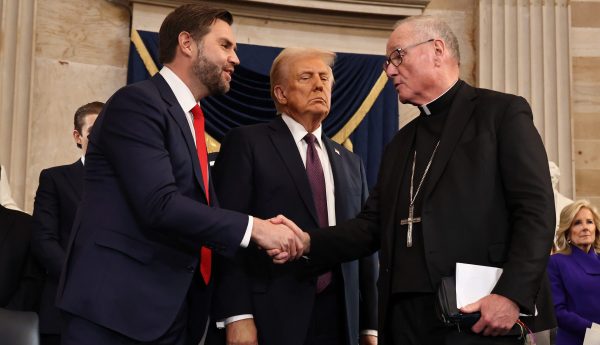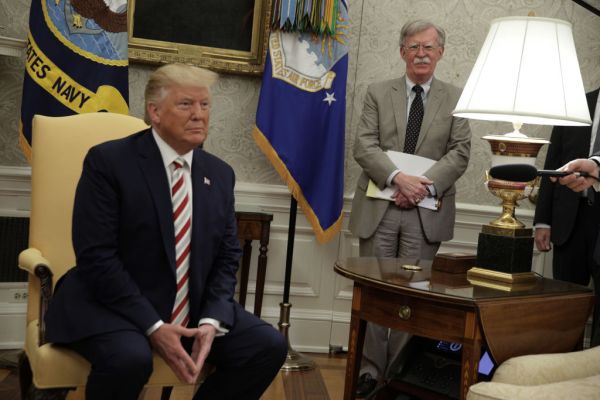In Northern Virginia, the chatter is happening—at the bus stop in Falls Church, at a party near Mount Vernon, during a PTA meeting in Fairfax, and on neighborhood Facebook pages from Fredericksburg to Leesburg. Should I take the buyout? Our big contract may be next on the chopping block. How much of my team will be furloughed? There aren’t enough parking spaces at work. What will Donald Trump and Elon Musk slash next?
The Trump administration’s carpet bombing of the federal bureaucracy is causing a wave of uncertainty in the Washington suburbs. Whatever the political upside for Trump in taking on career government officials (and there may be a lot, given the historically low trust Americans have in Washington), his efforts to shake up D.C. may have the opposite effect just across the Potomac River, where such slashing and burning hits close to home. That question—whether Trump’s large-scale reordering of the federal government will result in any kind of popular backlash—will be put to the test soon, with Virginians set to vote in their traditional off-year gubernatorial election this November.
Based on early polls—and historical precedent—Democrats are in a good position to take over the state’s Executive Mansion. In all but one gubernatorial race in the state since 1977, the winner has come from the party that doesn’t control the White House. This phenomenon is often overinterpreted as a referendum on the new presidential administration, but in Trump’s case, a win for Democrats in the Old Dominion may actually have a lot to do with his actions.
Brian Moran, a former state legislator and onetime chairman of the Virginia Democratic Party, described the White House’s “attacks” on the federal workforce as a potential motivating factor for a big chunk of the electorate. “It generates a tremendous amount of ill will towards the party in power,” Moran, who is based in Northern Virginia, told The Dispatch. “I think what was reflected in the national election was that a lot of voters didn’t feel as though the Democrats were focusing on their issues, the bread and butter right issues. But there’s no bigger bread-and-butter issue than a job.”
The DMV area—short for the District of Columbia, Maryland, and Virginia—operates like a company town, and more than 90,000 federal workers live in Virginia communities like Arlington, Alexandria, and Fairfax County. Federal contractors, professional and business services, and real estate and building services are all vital to Northern Virginia’s economy, which is built on the various departments, agencies, and offices of the federal government that, for better or for worse, have contributed to the region’s economic stability.
Until now. Musk’s Department of Government Efficiency (DOGE) and the White House’s Office of Management and Budget (OMB) and Office of Personnel Management (OPM) have torn through the executive branch with abandon, freezing grants, shutting down offices, and setting up the now-infamous “fork in the road” buyout option for federal workers. All of the changes seem to have taken the civil service by surprise.
Many of these efforts have been slowed by legal challenges, adding to the uncertainty, but the White House has also secured some victories in court. Earlier this week, a federal judge lifted a court-ordered pause on the deferred resignation program, which will allow federal workers to quit their jobs while continuing to be paid and receive benefits through September 30. About 75,000 employees across the country—just over 3 percent of the total federal workforce, below what the administration had hoped—agreed to take Trump up on the offer before the February 12 deadline. But for the remaining 97 percent, their own job security is very much up in the air.
The executive branch maneuvering isn’t the only potential upheaval these federal workers face, as lawmakers could very well fail to reach an agreement to fund the government when the current deal expires on March 14. That could mean furloughs, delayed paychecks and contracts, and other disruptions that would be felt throughout the local economy. And with Republicans in total control in Washington, that scenario could bode well for the Democratic Party in 2025.
“There’s no bigger bread-and-butter issue than a job.”
Brian Moran
That said, none of the party’s leading candidates for the three statewide offices—governor, lieutenant governor, and attorney general—hail from Northern Virginia, leaving Democrats without an automatic base of support there. And the region leans heavily Democratic, meaning the party’s turnout in the most populous part of the state could be dampened by noncompetitive races for the state house of delegates.
“These actions by the Trump administration give the Democrats an organizing opportunity to help their statewide ticket,” said Chris Saxman, a former Republican state senator and political blogger.
The leading Democratic candidate for governor, Abigail Spanberger, has already spoken out on behalf of federal workers she describes as “moms and dads” and “our neighbors.” The former congresswoman, who also previously worked as an operations officer at the CIA, has argued the shakeup in D.C. could have broader effects beyond the Commonwealth. “This is a kitchen-table issue in Virginia, but the impact is substantial across the entirety of the country,” Spanberger said during an MSNBC appearance last week.
The likely Republican nominee, Lt. Gov. Winsome Earle-Sears, has taken a different tack and expressed support for Trump’s actions in an interview with the Associated Press. “He’s making an audit of who’s doing what, how are they doing it, where are they doing it, and how are they supposed to be doing it?” Earle-Sears said. “Is it according to the law? Can we make some savings?”
This dynamic—Republicans reflexively defending Trump’s moves, Democrats defending the civil service—look on paper to be a net benefit for the GOP, particularly while the new president’s poll numbers are so relatively high. But with the right conditions, Democrats demoralized by Trump’s win last November could find their rallying cry: against a chaos government. And a victory in Virginia’s gubernatorial race may, in turn, serve as a model that Democrats across the country could try to emulate in the all-important 2026 midterm elections.
To most Americans, federal office workers being concerned about their job security is hardly a sob story, but many of the agencies and offices these people work for are not as unpopular as Republicans or conservatives might imagine. According to a Pew Research study from last year, most of the “name brand” agencies of the federal government have a net positive favorability, with only the Department of Education, the Department of Justice, and the Internal Revenue Service underwater with Americans.
Yet for all of these signs, Virginia’s recent political history suggests Republicans could perform stronger than expected. While the vote-heavy Northern suburbs have only become more Democratic in recent years, Trump has increased his hold on the vast rural stretches of the state. After Joe Biden’s 10-point victory in Virginia in 2020, Republican Glenn Youngkin won his race for governor a year later by 2 points. And in 2024, Trump and his running mate J.D. Vance campaigned in Virginia and lost the state narrowly—by 5 percentage points—to Kamala Harris.
But political trends can be arrested by events, and Democrats are hoping Trump’s barnstorming through Washington may do more than just boost their chances in Virginia.
“My handicap would be that Democrats will successfully be able to nationalize this race,” said Moran.










Please note that we at The Dispatch hold ourselves, our work, and our commenters to a higher standard than other places on the internet. We welcome comments that foster genuine debate or discussion—including comments critical of us or our work—but responses that include ad hominem attacks on fellow Dispatch members or are intended to stoke fear and anger may be moderated.
With your membership, you only have the ability to comment on The Morning Dispatch articles. Consider upgrading to join the conversation everywhere.